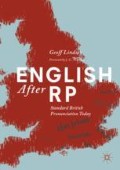Abstract
The vowel of LOT is now less open than in RP, [ɒ] > [ɔ]. It has widely replaced the THOUGHT vowel in words like false and salt, and for many speakers is replacing the GOAT vowel in words like old and whole.
Keywords
FormalPara In BriefThe vowel of LOT is now less open than in RP, [ɒ] > [ɔ]. It has widely replaced the THOUGHT vowel in words like false and salt, and for many speakers is replacing the GOAT vowel in words like old and whole.
The vowel of LOT (and clock, got, not, Potter, quality, what, etc.) is short, back and rounded. It’s a distinctively Southern British vowel which General American lacks.
In RP, LOT was a very open vowel, produced with the tongue body low and back in the mouth. For this sound the IPA symbol [ɒ] was appropriate. Openness was a more important feature of this RP vowel than lip rounding, so that many RP speakers pronounced it as a short, unrounded [ɑ].
Over recent decades, the LOT vowel has risen in the vowel space, to become more like the typical open-mid vowel found in many languages, e.g. German kommen, Italian posso, Scottish English Loch Ness, Canadian English Toronto. The IPA symbol for this kind of vowel is [ɔ].
The established RP symbols cause a good deal of confusion: the /ɔː/ seen in British transcriptions misleads many people into thinking that the IPA symbol [ɔ] represents a sound like the SSB THOUGHT vowel, but that is now closer to [oː] (see Chap. 4).
Although LOT has raised, it has not become the mid ‘o’ vowel of very many languages, such as Spanish and Japanese. Speakers of these languages still need to make LOT more open than their ‘o’.
The LOT vowel has not only changed in quality. Its distribution has also changed, so that it’s heard increasingly in words where RP had the THOUGHT or GOAT vowels.
THOUGHT > LOT words
These words have /l/ followed by a consonant: mainly /t/, sometimes /s/ or /d/. The change is more established in frequently used words, e.g. halt and salt, and less common in rarer words, like cauldron.
-
Examples:
-
alter, alteration, alternative, assault, Baltic, cauldron, false, falsify, fault, faulty, Gibraltar, halt, malt, Malden, Maldives, Malta, salt, vault, Walter
GOAT > LOT words
These words, with a syllable-final dark /l/, had the GOAT diphthong /əʊ/ in RP. Today, SSB speakers usually have GOAT backing in this context. This means that they shift the first part of the diphthong from schwa [ə] to the quality of the LOT vowel, creating [ɔʊ] or [ɔw]; some transcribe this as [ɒʊ], referring to the shift as ‘GOAT allophony’. See Chap. 6.
Increasingly, younger speakers simply use the short LOT vowel [ɔ] in these words.
Examples:
-
bold, bolt, bowl, coal, cold, control, fold, goal, gold, hold, hole, holster, mould, old, patrol, poll, poultry, role/roll, shoulder, soldier, sole/soul, stroll, told, troll, volt, whole
Author information
Authors and Affiliations
Rights and permissions
Copyright information
© 2019 The Author(s)
About this chapter
Cite this chapter
Lindsey, G. (2019). Chapter 7 A LOT More Common. In: English After RP. Palgrave Macmillan, Cham. https://doi.org/10.1007/978-3-030-04357-5_8
Download citation
DOI: https://doi.org/10.1007/978-3-030-04357-5_8
Published:
Publisher Name: Palgrave Macmillan, Cham
Print ISBN: 978-3-030-04356-8
Online ISBN: 978-3-030-04357-5
eBook Packages: Social SciencesSocial Sciences (R0)

